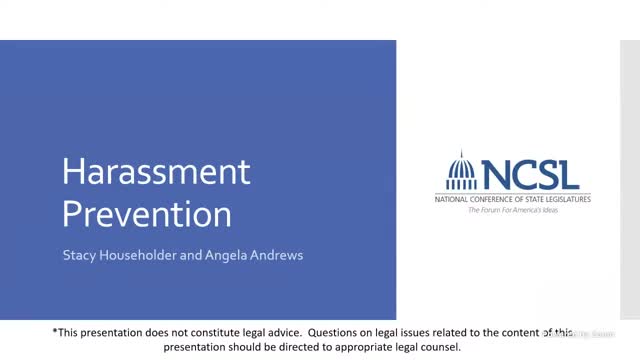Vermont House receives sexual‑harassment prevention training from NCSL facilitator
Get AI-powered insights, summaries, and transcripts
Subscribe
Summary
Members of the Vermont House participated in an interactive sexual‑harassment prevention training led by Stacey Householder of the National Conference of State Legislatures. The session covered definitions, reporting options, bystander intervention and Vermont‑specific legal standards.
Members of the Vermont House participated in an interactive sexual‑harassment prevention training led by Stacey Householder of the National Conference of State Legislatures (NCSL), covering definitions of harassment, reporting options, bystander intervention and Vermont‑specific legal standards.
Householder, identified in the session as the NCSL facilitator, told members that the training was intended to strengthen the institution beyond basic compliance and to provide tools for a respectful workplace. "I hope by the end of this, you'll see this as more than just compliance training," she said.
The training used real‑world scenarios drawn from legislatures nationwide and a short recorded segment from Jonathan Siegel, a harassment lawyer who outlined a four‑category framework for misconduct ranging from uncivil or abusive behavior to criminal assault. In the recording, Siegel described the categories and said they are fluid but that "all 4 categories of behavior are unacceptable." He emphasized the difference between behavior that may be uncivil and behavior that is unlawful, noting examples such as quid pro quo demands as clearly unlawful.
Householder and the group reviewed how harassment and sexual harassment are defined in the panel's policy. She said harassment is "unwelcome conduct based on a protected characteristic," and that sexual harassment includes unwelcome sexual advances or conduct that becomes a term of employment or creates an intimidating, hostile or offensive environment. She highlighted that harassment can be verbal, physical, visual or a combination and that it may be subtle or overt.
Participants worked through six scenarios from a written discussion guide. The session addressed common situations that arise in legislative settings, including whether a handshake is harassment (generally no, Householder said, but repeated unwanted touching can become a problem), when flowers or other gifts cross a line, persistent texting to a lobbyist, and comments about a staff member's appearance or pregnancy. Householder noted context and the recipient's view determine welcomeness; she told the group that intent does not negate impact.
The training singled out several legal and procedural points for Vermont specifically. Householder said Vermont does not require conduct to be "severe or pervasive" to be considered harassment; instead, "any unwelcome ... conduct that exceeds a petty slight or an inconvenience could be considered potential harassment." She also said the House policy covers not only legislators and staff but also people who use the Capitol for business, including media, lobbyists, advocates and constituents.
Attendees reviewed reporting options available to staff and members: internal human resources, the House's harassment prevention panel, supervisors for staff, and external authorities such as the U.S. Equal Employment Opportunity Commission, the Vermont Human Rights Commission, the Vermont Attorney General's Office and the State Ethics Commission. Householder warned that some external processes have filing timelines.
A significant portion of the session focused on bystander intervention and retaliation. Trainers stressed that retaliation against someone who reports harassment or cooperates in an investigation is unlawful. Participants practiced the "4 D's" of bystander intervention—direct, distract, delegate and delay—and discussed practical responses for hallway or social settings and for situations in private meetings where staff may feel silenced.
Householder closed by urging members to take small, daily steps to improve workplace respect: "Identify one small thing that you can do each and every day to make this place just a little bit more respectful," she said. The training was interactive; Householder noted legislative staff had received the same training the prior day and that facilitators would share materials and the PowerPoint used in the session.
